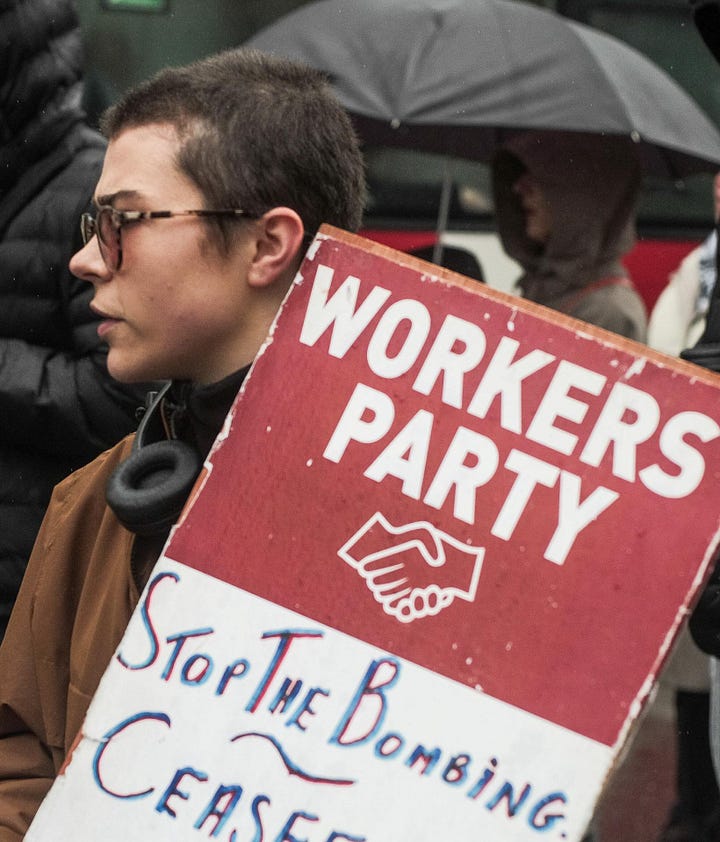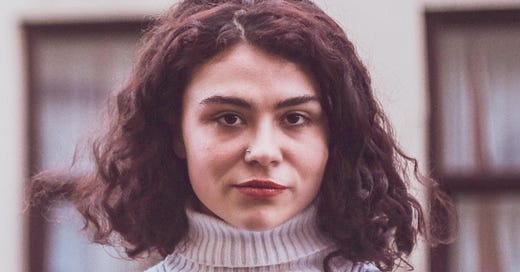21 and running for City Council
Local election candidate Rachel Hurley Roche is campaigning for a shift away from old-school parish politics. She believes that we need to think smarter, not harder, and is wary of Sinn Féin.

Rachel Hurley Roche grew up in Ballyvolane on the north side of Cork city. As a teenager, she joined the Connolly Youth Movement and was an active member of this socialist youth organisation for just over four years.
Since then, she has been heavily involved in various community projects; including spending a year working with the Traveller Visibility Group on Lower John Street in Shandon.
Now twenty-one years old, Rachel is studying Youth Work and Development Education in Maynooth, Co. Kildare (while living full-time in Cork city). In June, she’ll be running for a seat in the Cork City Council local elections and is hoping to be elected in the South East Ward on behalf of the Workers Party.
But where does this strong interest in politics and activism stem from and how did she get to be so involved in her local community?
“Whether they can articulate it or not, people understand their own position in society and when I was younger, I got a sense things were unfair, so I decided to get some language to help me express this frustration, which is much better than just saying, oh the world is a terrible place.”
“


Feeling a keen sense of dissatisfaction with how the city council is run in her home city, especially compared to some of its European counterparts, Rachel would like to see things done differently.
“There is a much better understanding in Europe of what you can do in city councils and what people can compel a council to do for them.”
“Unfortunately, democracy within the city council in Ireland is one of the weakest in Europe and what most people don’t know about council meetings is that anyone can attend, but they’re not really accessible and you have to register beforehand.”
As always seems to be the case, Rachel feels there is an appetite amongst the public for politics to be done in an alternative way.
“People are looking for change. Sinn Féin might have been that option in the last election, but they’ve been pandering to everyone for the last few years trying to be everyone’s friend, but they have to be lying to someone.”
The kind of change Rachel is advocating for would involve a radical shift in how people view the relationship between politicians and the electorate.
“The public has access to the council, but a lot of people are ashamed to ask.”
“I think it’s time to move away from old-school parish politics where you approach a councillor and ask for something to be done in a clinic. Communities benefit from skill sharing, not from someone making promises and saying, yeah I’ll do this for you.”
“Obviously there are some exceptions to this such as vulnerable people, but this kind of setup does a disservice to communities that want change.”
An obvious example Rachel uses to illustrate her point, is that of dereliction and all the vacant houses across the city.
“Cork city has a compulsory purchase order but uptake is very low, because you have to find the landlord or the owner of the building, but more resources should be put into CPOs.”
“It’s not right that local people want to offer their skills to restore empty buildings, but are being told no.”
“I know from my own area that some carpenters offered to fix up derelict houses for free and they would be able to use their own sole trader insurance to do so, but were told no by the council.”
“We need to think smarter not harder, because there is an incredible amount of bureaucracy and lots of micro departments in the council, so no one person is at fault, but if we allocate responsibility then people will have more of a stake in it and want to look after the community.”
The issue of maintenance is of particular annoyance for Rachel.
“Between all the wards, there is only €200,000 per year to spend on maintenance, but councillors argue over how it should be spent and it just ends up being spent all at once in the last few months and people see work being done and say, there must be an election coming up. And they’re right!”
“There is so much urban clutter in Cork, like the lights on the bollards on Oliver Plunkett street. They have been broken for years but instead of fixing them, the council put lights overhead.”
“The robotrees are another example. They piss people off and there is no money being spent on their maintenance.”
Although Rachel is frustrated by lots of what she sees around her and at one point considered moving to Germany or Austria with her partner as “they have better transport, clean water and it seems a better place to raise a family” she has decided to stay in Cork instead.
A lot of friends however are choosing to emigrate because “young people don’t see it worthwhile to stay in Ireland.”
But Rachel would like to get a chance to implement some change and despite juggling working in retail in Mahon with her studies, she has already begun campaigning.
“We did dead drops first, which means leaving leaflets through letterboxes, but we’ll be out knocking on doors before long.”
“Social media doesn’t sway people as much as you’d think, it’s much more important to meet people in person.”
“And people are receptive to what you say and I’m looking forward to hearing what they have to say also.”
The local and European elections will be held on June 7. You do not have to be an Irish citizen to vote in a local election, but you must be resident in the State to register on the Register of Electors.
To vote in a local election, you must be over 18 years of age, live in the local electoral area, and be listed on the Register of Electors. Check the Register here
How can we strengthen local government in Ireland?
Cinderella and the Constitution I cannot claim credit for coining the phrase that local government is the Cinderella of the Irish political system. It has been used by other academic scholars before and what they generally mean is that local government is under-studied, under-researc…





I am very impressed by Rachel and admire her ideas and determination, wishing her the best of luck with her campaign.
Fair play to her